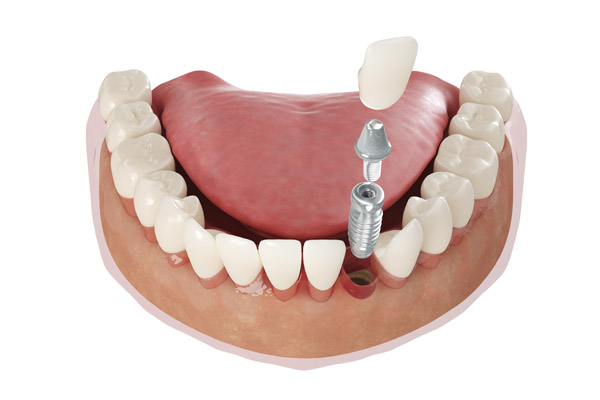 Many patients who have missing teeth consider dental implants as an option to restore the look and function of their smile. When deciding whether to have the procedure, it is important to learn as much as possible about the treatment.
Many patients who have missing teeth consider dental implants as an option to restore the look and function of their smile. When deciding whether to have the procedure, it is important to learn as much as possible about the treatment.
4 things to know about dental implants
There are a variety of things patients should know about dental implants when considering the procedure.
1. There are different kinds of implant procedures
Dental implants come in two types and three sizes. Endosteal implants are the most common type. An implant screw, dental prosthesis, and a connector piece are the components of this type of implant. They come in standard, wide and mini sizes. Wider sizes are used for restoring molars and mini sizes are employed in tight spaces or with patients who lack the bone mass to support larger implants. Periosteal implants are made from a metal framework that is placed under the gums and on top of the jawbone.
2. Implants require dental surgery
Dental implants require dental surgery to place the posts in the jaw. Before the surgery, your dentist will take X-rays and perform a cone beam computed tomography scan to use in creating your treatment plan. During the procedure, the dentist removes any damaged or decayed teeth and then makes a small incision in the gums to expose the jawbone.
Next, the dentist shapes the tooth socket to prepare it for the implant screw. The dentist then places the implant in the jawbone and attaches a connector piece that will hold the replacement tooth. The dentist then moves the gums back into place and closes the incision with stitches. The dentist may attach a temporary restoration to the connector piece.
3. Dental implants require patient commitment
The jawbone must bond with the implant before the final restoration can be attached to the connector piece. This process usually takes three to six months. During this time, the implants are susceptible to damage because they are not strongly anchored into the jaw. Patients must follow their dentist's instructions during the recovery period to avoid complications, such as implant failure. Keep the implant site clean, follow the recommended daily hygiene routine, and eat soft foods during the recovery period.
4. Dental implants require a larger upfront investment than other restorations
Patients should be prepared to pay more for dental implants than other types of restorations. However, because implants are more durable, they may be more affordable over the lifetime of the treatment. Other restorations may need to be replaced. Dental implants can last a lifetime. Additionally, because implants help patients avoid bone loss, they may save the patient money on future dental treatments.
Conclusion
The more you learn about dental implants, the better prepared you will be for the procedure. Talk to your dentist about what you should know about the procedure and be sure to ask questions about anything you do not understand or are concerned about.
Request an appointment or call Grand Valley Dentistry at 616-259-6046 for an appointment in our Allendale Charter Twp office.
Recent Posts
Dental implants are an option for people who need to replace one or more missing teeth. The process involves several steps during which a metal post is surgically mounted into the jaw. The replacement tooth or crown is then secured to the implant, holding the new tooth firmly in place.Missing teeth can have an adverse…
According to the American Dental Association, dental implants are stable because the jawbone grows around them. This process is known as osseointegration, and it is essential for the success of an implant. Several elements can affect this process, and patients undergoing the dental implant procedure should understand what affects an implant fusing to the bone.…
Tooth loss can be caused by injury, disease, or tooth decay. If you are missing one or more teeth, dental implants may be an option for you.Dental implants are metal posts that resemble screws. The posts are inserted into the jawbone of the patient to replace the tooth roots of missing teeth. The implants can…


